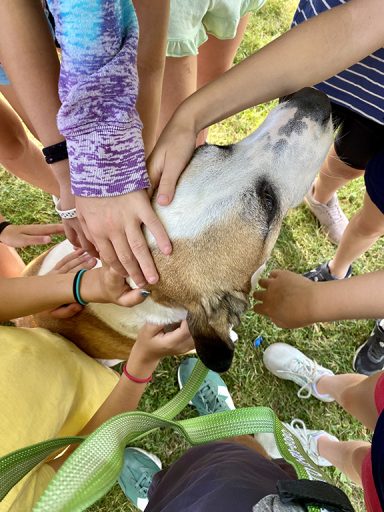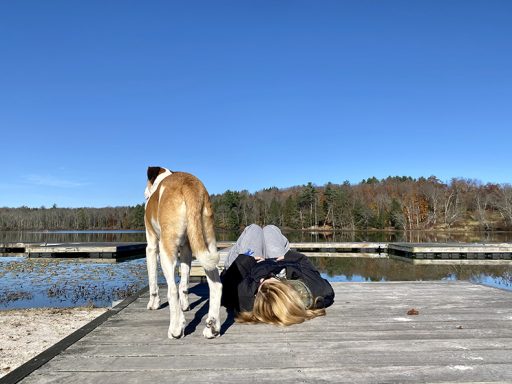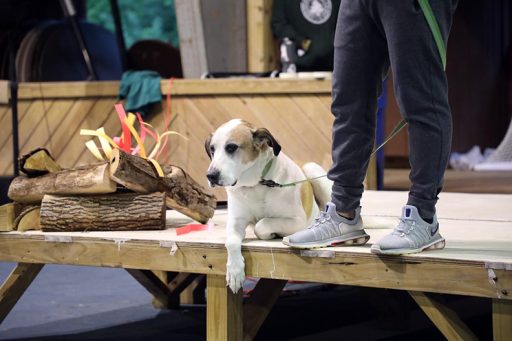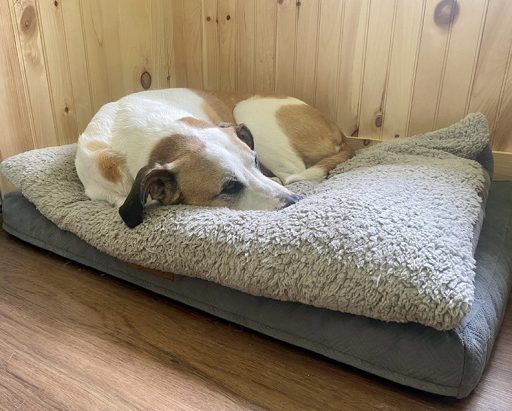By Aaron Selkow
Apollo joined our family in 2017. We had previously rescued two other dogs, and both had been special. But Apollo’s impact on our family was incomparable. He was born in South Carolina, horribly abused, and thankfully saved by a rescue organization in Pennsylvania. Ann looked into those soulful eyes in a photograph and somehow knew that he needed us. And as we mourn his loss, we cannot express just how much we needed him.
Helping Apollo took work. He was not just skittish because of the treatment he received in the years before we adopted him, he was deeply afraid. The training and coaching he benefited from influenced his behavior, and his gentle disposition was steadily complemented by a growing sense of confidence. Although we were unable to have him with other dogs extensively, he was immediately at home when I brought him to camp for his first summer in the Poconos (as the director of my last camp, before arriving here at Chestnut Lake). As he continued to settle into himself and became a mainstay in our lives, a very important shift occurred. At some point, Ann and I realized that Apollo was our teacher.
In the days since he left us, we have reflected more thoughtfully on the ways that Apollo provided us with poignant and powerful life lessons. We sometimes remarked to each other on the ways that his unique story and character impacted those around him. But in losing him, we find ourselves more philosophical as a way to cope with the sadness. Because camp is so synonymous with our family, camp became a cornerstone in Apollo’s life, too. As we remember Apollo now with only the ghosts of memories from the last six years to sustain us, it feels natural to frame some of the lessons we learned from Apollo in the context of camp.
Being a camp leader requires you to accept the blurring of lines between your personal and professional lives. Not only is camp an intimate setting that creates a familial environment for campers and staff, but the demands of overseeing a camp remove some of the usual boundaries found in other roles. You live at camp, immersed in the community, and committed to the success of others in every way possible. There is almost no personal space, and a camp leader’s willingness to be vulnerable and invite others into their family can have a prominent and positive influence. Apollo was a terrific example of and asset in this effort. Apollo was our dog, but he was also the Camp Dog. Even our prospective families had the chance to learn about Chestnut and our family by meeting Apollo, as our summer and off-season tours would frequently begin and end at our house where Apollo would be. In so many ways, Apollo represented our family to others and our care of him was representative of our values. Ann and I would say that Apollo was by far the most popular Selkow. When Lily would visit us at camp, her greeting for Apollo was the most enthusiastic and she relished seeing so many other children scrambling to be near her dog. We were humbled to be Apollo’s real family, knowing that countless others considered him to be part of their own at camp.
We often say that at camp you can become your best and truest self. It may be cliché, but every year I am reminded of this adage when I notice how people step into the virtual limelight of camp and show how impactful time and experience at camp can be in bringing out their finest qualities. Apollo was also at his best at camp. It was at camp that he provided the most happiness to others – as Ann walked Apollo around the property each day, he was like a magnet for the kids who needed him. They craved the chance to tap into Apollo’s energy while they might be many miles away from their pets and their homes, and he obliged them gently. His aloof demeanor was a great match for their sometimes-unbridled enthusiasm, and though he might be scared, he also would get comfortable enough at times to lay down and allow others to cuddle with him. But it was just being at camp that brought Apollo joy. The ability to run and explore when nobody was around, chasing (and never catching) a deer, bounding across the lake’s sandy beach, or just running until he completely wore himself out on any day that we were there was evidence of camp being his favorite home.
was also at his best at camp. It was at camp that he provided the most happiness to others – as Ann walked Apollo around the property each day, he was like a magnet for the kids who needed him. They craved the chance to tap into Apollo’s energy while they might be many miles away from their pets and their homes, and he obliged them gently. His aloof demeanor was a great match for their sometimes-unbridled enthusiasm, and though he might be scared, he also would get comfortable enough at times to lay down and allow others to cuddle with him. But it was just being at camp that brought Apollo joy. The ability to run and explore when nobody was around, chasing (and never catching) a deer, bounding across the lake’s sandy beach, or just running until he completely wore himself out on any day that we were there was evidence of camp being his favorite home.
We have high expectations of each other at camp. Whether you are a camper or a member of our staff, we challenge our community to accept our rules and to always model our institutional principles. As we move throughout the day at camp, we inevitably see issues that cause us to correct or redirect. I can sometimes assume that the person I see struggling to live up to our standards is making a choice, but that is often not the case. Apollo was a dog that benefited from structure, and consistency, and living at camp – even as a dog – required him to behave well, too. Without knowing all the harm that Apollo had survived and the constant effort he needed to make to manage his fears, you might see him failing to follow a command or getting overly excited to mean that he lacked obedience or a desire to please. But that was so far from the case – behind his presentation as a large, strong animal was a history of being a victim. Apollo reminded us not to judge too much and to take things and people (even dogs) for what they are: inherently good, complex, deserving of love, and yet still flawed. We try to treat our campers and staff with respect, especially when they might be struggling because we can’t assume to understand what might be behind their actions. Apollo was not defined by his past, just as our community members should never be.
Research into the relationship between humans and their dogs details how much the unconditional  warmth that is shared between owners and their pets is worth. Apollo was no exception to this. As some at camp could attest, when he created a bond with someone, his relentless attention to them and his drive to be near them was unparalleled. Apollo’s recognition felt like pure love to us, and that bond reminded us of the friendship and fellowship that we saw day after day between people at camp. Campers and their bunkmates, the kids and their favorite counselors, and the staff that worked so closely together all appreciate and provide love at camp. Camp is filled with opportunities for growth and learning, but at the core, camp is a place that values this love. Apollo’s deportment was a perfect representation of the power of showing love to one another.
warmth that is shared between owners and their pets is worth. Apollo was no exception to this. As some at camp could attest, when he created a bond with someone, his relentless attention to them and his drive to be near them was unparalleled. Apollo’s recognition felt like pure love to us, and that bond reminded us of the friendship and fellowship that we saw day after day between people at camp. Campers and their bunkmates, the kids and their favorite counselors, and the staff that worked so closely together all appreciate and provide love at camp. Camp is filled with opportunities for growth and learning, but at the core, camp is a place that values this love. Apollo’s deportment was a perfect representation of the power of showing love to one another.
When I sit with campers or staff members who are dealing with mistakes that they have made at camp, I always remind them that there is no better place to fail than at camp. Camp is a safe place. Although far from being utopian, it is still far more forgiving than the real world. People at camp chose to be at camp because they care about others, and high fives, fist bumps, and hugs are always available to help console those in trouble. Camp is also a place where we can laugh about the hard times, whether in the moment or after we have gained perspective. Apollo enjoyed the compassionate environs of camp, whether it was after he ate someone’s hot dog at a cookout, came  out of the woods covered in unbearable filth, or went to the bathroom in the wrong place. One such example was at our closing Tribal (Color War) event in 2021 when the teams were gathered on the main athletic fields preparing to hear me announce the winner. Apollo slipped away from our house, heard my voice from hundreds of yards away, ran to me, and promptly crouched in front of the entire camp to leave his own Tribal trophy on the third-base line. Apollo was forgiven at camp for his foibles, and he helped us to keep that in mind when we or others around us slipped up. Camp is at its best when it is a place where – like Apollo – we can do the wrong thing and be forgiven for it, as long as we show that we meant no harm and are willing to do better.
out of the woods covered in unbearable filth, or went to the bathroom in the wrong place. One such example was at our closing Tribal (Color War) event in 2021 when the teams were gathered on the main athletic fields preparing to hear me announce the winner. Apollo slipped away from our house, heard my voice from hundreds of yards away, ran to me, and promptly crouched in front of the entire camp to leave his own Tribal trophy on the third-base line. Apollo was forgiven at camp for his foibles, and he helped us to keep that in mind when we or others around us slipped up. Camp is at its best when it is a place where – like Apollo – we can do the wrong thing and be forgiven for it, as long as we show that we meant no harm and are willing to do better.
As a teacher, Apollo was profound. His lessons were easy to understand, and he drew on the emotional connection that he formed with us to make them stick. In the wake of losing him, we are struck by the effect that he had on us. We know that there are members of the camp family who will also miss Apollo very much and are grateful for him being with us at camp over the last four years.
We know that many people reading this can empathize, too, with our struggle to deal with his loss. In fact, these recent days have been filled with much more significant despair in the world and there are far too many people that are coping with the loss of people and things that they love in their lives. As the leaders of Chestnut Lake, we are very aware that our work this summer will be important to (once again) provide the protection, freedom, growth, and joy that our campers deserve in spite of the real-world pressures and worries that our families face at home. Sharing these thoughts about Apollo is evidence of how much we value even the most subtle opportunity we have to model our values and the commitment we have to making camp a place that helps people in deep and meaningful ways. Just like it did Apollo.
We will cherish the moments we had with him and understand how fragile life can be. Sharing him with you was an honor and pleasure – may his memory be a blessing.
If you would like to assist in the rescue of at-risk dogs, please consider joining us in supporting Home at Last Dog Rescue.


Leave a Reply